COVID
BJC COVID-19 Management
The continued outbreak of the novel coronavirus (COVID-19) has devastated societies, and global economies, severely impacting businesses ability to operate at their respective capabilities, impacting strategies, operations and income. In response to the outbreak, government entities have enacted various laws, regulations and procedures to control the spread of the virus, such as lockdown and curfews procedures, in an effort to control the spread of the COVID-19 outbreak. In compliance with such COVID-19 control regulations, businesses operating hours and activities are restricted, disrupting financial transactions and thus cash flow within the economy, resulting in largescale socioeconomic impact to the economy in medium-long-term.
Like many other businesses, Berli Jucker Public Company Limited (BJC) was also been affected by the continued spread of COVID-19, in addition to various procedures, implemented to control the virus, primarily through decreased number of instore customer, limited operating hours, and decreased consumer purchasing power, a consequence of decreased financial circulation in the market, as consumers become more conscious regarding their spending decisions, leading to decrease demands for certain types of products, while increasing for others, impacting planned medium and long-term business strategies.
BJC foresee that, as a repercussion of continued COVID-19 outbreak, business operations will be affected for the next three years, even after improvement or resolution of COVID-19, from shifting consumer behaviors, changing consumers spending behavior long-term . The shift in consumer spending behavior present BJC with both risks and opportunities to reassess internal operations, to identify new business opportunities, in order to retain competitive advantage. In addition, BJC have reprioritize production and business strategies of products and services throughout the five key supply chains including, decreasing the number of new Big C Hypermarkets format expansion, to instead focus on small store formats, such as Mini Big C in Eastern Region of Thailand, enabling for a more efficient use of logistics resources, decreased the unit stockpile of highly perishable products such as fresh fruits and vegetables and other food related products in the modern retail and consumer supply chain, to meet decreased consumer needs, while increasing production and availability of necessary products and services from other supply chains, such as access to necessary medical supplies in the healthcare supply chain. Despite BJC’s profit loss from such changes, BJC is committed to make necessary adaptation to ensure that surrounding communities have access to much needed food and medical supplies to survive COVID-19.

BJC COVID-19 Actions
BJC’s Board of Directors and relevant sub-committees such as the Risk Management Committee and the Sustainability Management Committee, is responsible for supervising and supporting the implementation of various activities related to COVID-19, whilst executive committee, working groups and related departments, is responsible for closely managing various activities, including monitoring situations and promptly identifies appropriate responses. BJC’s COVID-19 management is conducted in accordance the guidelines of the Stock Exchange of Thailand for sustainable development in the following 10 aspects.
1. Identifying Key Business Material Issues
BJC conducts an annual materiality assessment, enabling stakeholders to review the materiality topics and process for addressing each topics at: BJC MATERIALITY TOPICS AND BOUNDARIES
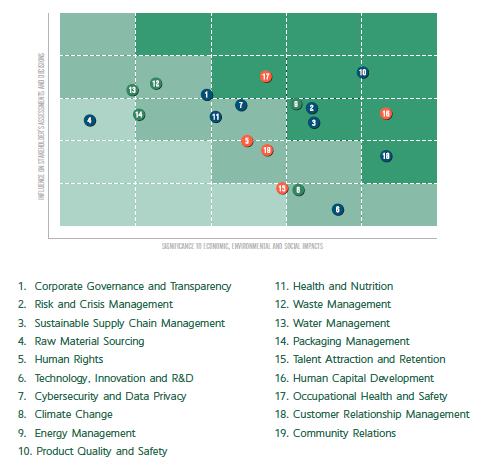
The consequences of COVID-19 affect almost all materiality topics, both directly and indirectly, especially in the topics of occupational health and safety, Risk and Crisis Management, Customer Relationship Management and Community Relations. BJC has assessed potential impacts and implemented appropriate management measures in all key business areas accordingly.
2. Risk Management
To adapt to the new normal market environment, as a consequence of COVID-19 outbreak, the Risk Management Committee, Risk Management Department and related Business Unites are accountable to closely assessed and develop appropriate strategies and action plans to mitigate operational impacts against COVID-19 outbreak. In addition to all risks types including, Strategy, Operations, Financial and Compliance risks. Furthermore, the Risk Management Committee is accountable to continuously monitor and update all COVID-19 related situation to the organization. BJC assessed risks related to COVID-19 in accordance with the guidelines recommended by the Thaipat Institute, for dealing with COVID-19 outbreak for businesses, covering all 6 relevant stakeholders including employees, customers, suppliers, communities, government agencies, and shareholders, implementing appropriate risk management processes such as,
-
Assessing and managing the health and safety risk for employees, customers, and other visitors entering the premises, preventing and avoiding risks through measures such as temperature screening, social distancing and regular cleaning etc.
-
Conduct supplier risk assessment in regards to procurement and transportation of raw materials sufficiently, or critical goods to operate business, especially during lockdown periods, to develop appropriate management guidelines.
-
Assess risks related to changes in government regulations or measures related to the pandemic such as lockdowns, compulsory requirements for establishments to implement measures such as improve work environment in accordance with government regulations, and manage risks which arises from both breaches and impact from compliance.
3. Business Continuity Management
BJC’s processes and procedures to manage COVID-19 derived from the established Crisis Management Plans, Business Continuity Management (BCM), Business Continuity Plans (BCP), Contingency Plans, and Recovery Plans, ensuring that BJC and all of our subsidiaries are able to endure operation effects of COVID-19. BJC established a special working group to closely monitor all COVID-19 related outbreak updates. The working group comprises of representatives from various relevant Business Units involved. COVID-19 management guidelines are discusses in meetings, held weekly to ensure that implemented guidelines are up-to-date with current situations. Furthermore, emergency planning procedures has been organized, in case of a lockdown in and/or surrounding operational areas, or if a COVID-19 cluster has been identified in close proximity to operations, providing a clear guideline of actions to reduce potential impacts on business and all stakeholder.
For more information regarding BJC’s COVID-19 Crisis Management, published by Sustainable Business Development Group of the Stock Exchange of Thailand, please see: SUSTAINABLE DEVELOPMENT SHOWCASES 2020 by SET
4. Sustainable Supply chain Management
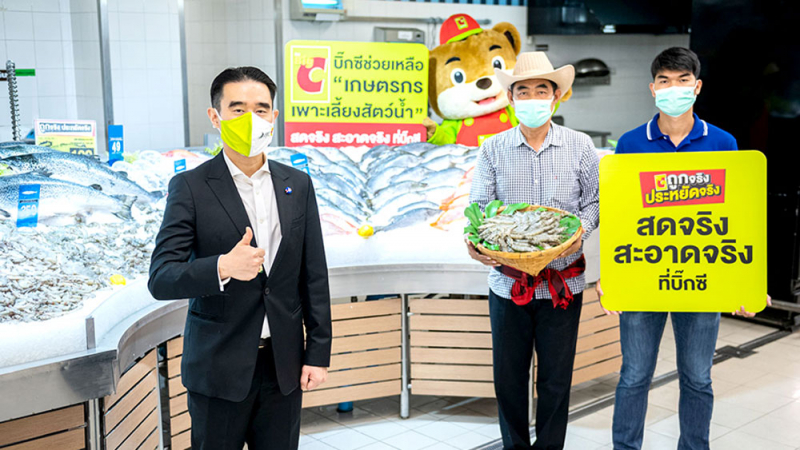
To maintain our commitment to ‘Growing Sustainably Together’ with all our valued suppliers and safeguard our survival from COVID-19, BJC provide assistance to suppliers severely impacted by COVID-19. This includes critical suppliers and suppliers of highly perishable products namely, fresh fruits, vegetables and food related products.
In addition, BJC also coordinated with relevant suppliers to reduce the volume of raw material and products to meet the need of the current market, reduced as a consequence of lowered customer purchasing power and/or demand.
BJC closely monitor all suppliers, emphasizing suppliers affected by COVID-19, whom are located in high-risk areas of COVID-19 infections, in lockdown zones and other critical domestic and international suppliers to identify and implement appropriate management approach during and after COVID-19, to assure that both BJC and our valued suppliers benefit from the measures, including identification of alternative suppliers. To defend BJC’s operations against potential COVID-19 contamination from external supplier’s logistics services, BJC allocated drop-off areas for external suppliers, and set appropriate COVID-19 safety guidelines to reduce infection risks, such as, all external supplier’s logistical personnel must wear a mask at all times whilst on BJC’s premises, while in high risks areas, all suppliers’ personnel must provide evidence of either a negative COVID-19 test or evidence of vaccination.
Finally, to leverage for the decreased operational flexibility, limited by lockdown procedures, BJC has registered relevant logistical agreements for COVID-19, namely applying for a specialized license to operate logistic services during lock-down, enabling logistical services to continue during COVID-19.
5. Customer Relationship Management
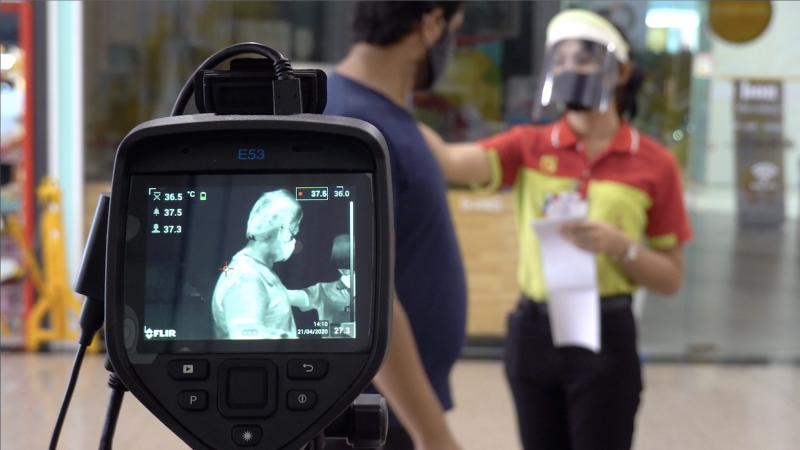
BJC places an importance on the health and safety of all customers whom enter the company’s premises. To minimize customer exposure risk to COVID-19, customer can preorder products to be prepacked through online channels and pick up their orders at the store without having to enter the store. Should customers enter the store, they can do so with confidence, since BJC has implemented the 40 preventive measures, to sanitize and disinfect all furniture and fixtures and enforce COVID-19 safety practices, such as temperature screening checkpoints, social distancing, specialize payment channels for high risks individuals (elderly and pregnant customers, routinely clear shopping carts and baskets.
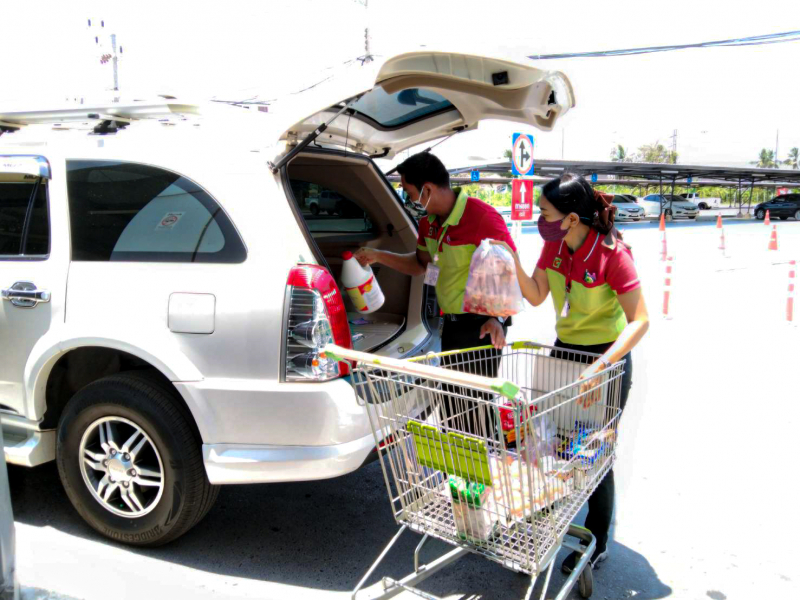
Furthermore, BJC offers various promotions to meet the needs of customers and in align with the current customer demand during COVID-19. This is especially evident in the retail group, which operates in accordance to the slogan “Tuk Jing Prayad Jing”. Big C also offer discounts on necessary products and offer promotions on popular products amongst customers, such as products which meets the needs of customers during work from home, or products for customers who wants to cook their own meals at home etc. Big C regularly conducts online and offline customer satisfactions survey to improve services and products according to the needs of customers.

Finally, to ensure that all customers have access to necessary products to safeguard against COVID-19, and able to maintain their quality of life during lockdown procedures, BJC review and revise product assortments.
To accommodate to customer needs during COVID-19, BJC increase imports and distribute of relevant medical equipment, such as oxygen machines, fingertip oxygen monitors, disinfectants set, supplements, and other household medicine and other drugs specified by the Food and Drug Administration. BJC also increased imports of ‘Antigen tests’, certified under the CE Mark and FDA from Korea, available in all 44 PURE shop, across 64 provinces nationwide.

6. Social and/or Environmental Business Innovations
To provide assurance to customers and adapt to changing customer needs and behaviors, in line with new market environment post COVID-19, BJC increased communication through various online channels, including Facebook and corporate websites, regarding all safety procedures implemented throughout BJC, to assure public safety throughout BJC’s premises, foster trust amongst customers, regarding BJC’s products, services and management to safeguard against COVID-19, whilst simultaneously introducing new shopping channels and mobile applications such as ‘Call Chat Shop’, ‘Big C Shopping Online’, drive through services and home delivery services.

7. Human Capital Management and Retention
As a consequence of COVID-19, the market environment has significantly changed. Beyond changing consumer behaviors, employee working procedures to minimize the risk of infections and the growth of online businesses, BJC recognized the importance of human resource development to develop sufficient knowledge and abilities to operate business in the new market environment, emphasizing on understanding and utilizing digital technology or digital literacy, in addition to training employees on customer services, to increase the quality of work and customer satisfactions.
Due to the continued outbreak of COVID-19, most employees have to work from home, restricting the implementation of traditional classroom training approach. To remediate this, BJC has developed an online employee training channel, which covers various courses that are necessary for employees in the current market environment.
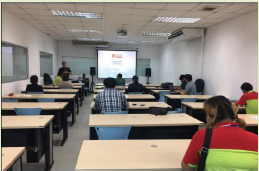
8. Occupational Health & Safety
Employees are one of BJC’s most valuable resources, in operating day-to-day operations, and safeguard operational survival during and after COVID-19. As a way to protect all employees under BJC’s control against COVID-19 exposure, BJC has implemented the following initiatives.
- Provides all employees with appropriate personal protective equipment’s (PPE), such as masks, and face shields to protect against COVID-19,
- Offers employees with employee only COVID-19 insurance deals,
- Increase insurance coverage to cover COVID-19 expenses,
- Strictly comply and enforce governmental safety guidelines and COVID-19 best practices to safeguard all employees throughout all operations, including in meeting rooms, and canteen by practicing social distancing, established screening checkpoints, prior to entering BJC offices and other premises.
In addition, BJC also enact the work from home (WFH) arrangements, by preparing sufficient required hardware such as notebooks and desktops for employees to effectively work from the safety of their homes. To protect BJC’s server against the increase exposure to cybersecurity risks the increase utilization of information technologies presents, BJC upgraded the internal cybersecurity systems such as VPN, limiting access to internal systems.
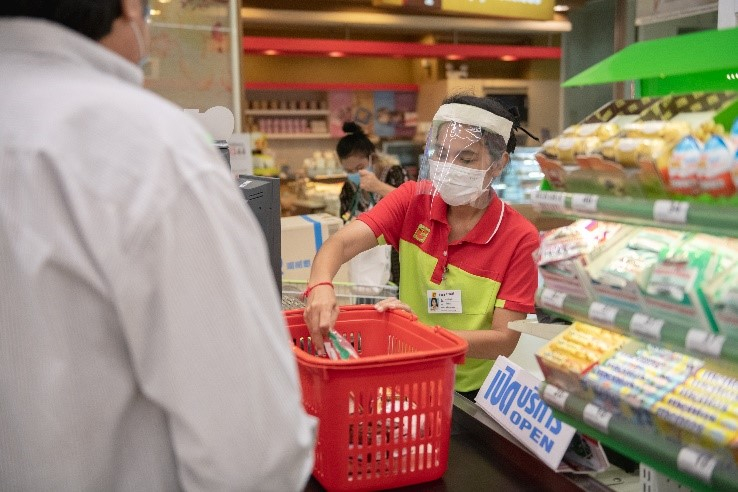

BJC acknowledge that not all types of work can be adapted to work from home (WFH), due to the nature of work, such as manufacturing based operations, like factories. To safeguard employee’s occupational health and safety, BJC has established various policies, enabling BJC to continue manufacturing products to sufficiently meet customer needs.
In regards to BJC’s management of the spread of COVID-19, BJC regularly assess risks in all operations, including offices, factories, warehouse, shops and customer services, and categorize risk levels to develop and implement appropriate management approach for each sites. Implemented management approaches includes, the 40 preventive measures, aligned with governmental guidelines, strictly enforced upon all employees to, practicing social distance throughout all operations, screen all individuals entering the premises, including employees, customers, or visitors, regularly disinfect high risk areas, provide employees with necessary equipment’s and protective gears including, face shields, alcohol, insurance and vaccines. In addition, BJC establishes various essential measures, such as work from home (WFH), and measures to manage infected employees accordingly. BJC also communicate and conduct knowledge sharing for employees to foster awareness regarding both internal and external topics to the organization. Finally, BJC established crisis management steering committee (CMST) to develop appropriate crisis management plans, business continuity plans (BCP) and closely monitor the situation, to update in the weekly meeting to develop appropriate management approach to fit with current situations.

Furthermore, in 2021, BJC was able to procure and provide employees with variations of the COVID-19 vaccines. BJC also enabled government entities and hospitals to utilize the Big C Hypersmart in the Bang Bon and Romklao district as a vaccination site for surrounding communities, providing communities with a safe vaccination location, for the duration of COVID-19.
9. Contributions to community or society development through business processes

BJC increased production and imports of various healthcare related products such as masks, alcohol, medical suppliers, and disinfectants, donating these essential medical supplies to various medical entities and needed communities. BJC also works with governmental entities to help communities through programs such as the ‘Commercial Discount for People’ project, offering discounts on products for society during COVID-19, by donating consumer goods to those impacted. BJC also engages in the distribution of necessary medical supplies throughout Thailand, through the assistance of the company’s connections.
-
Donation for Communities
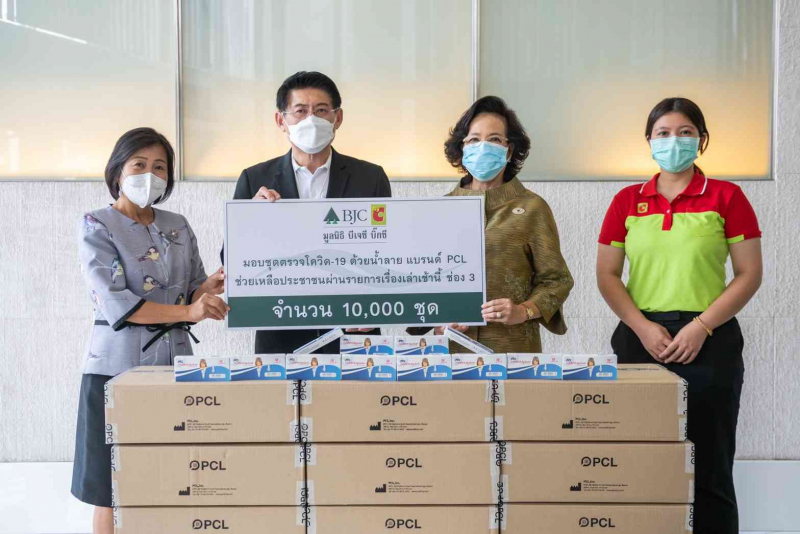
BJC Big C has observed the hardship of people in communities as a consequence of the continued outbreak COVID-19. For this reason, BJC strives to alleviate this hardship by continuously donating financial support, consumer goods and other necessary equipment’s to safeguard communities against the pandemic.
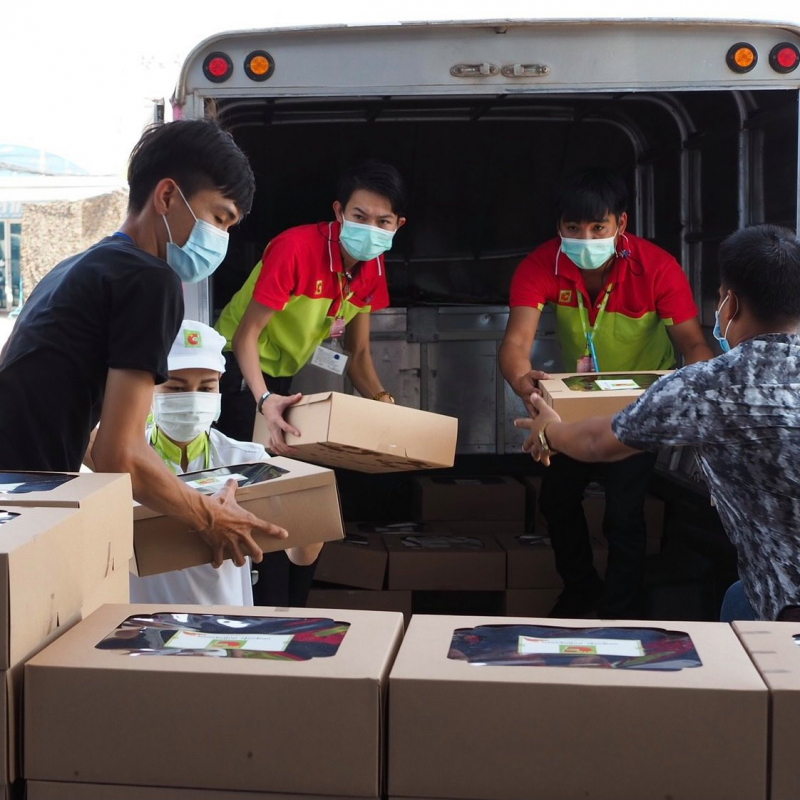
-
Assist Hospitals and Medical Personnel
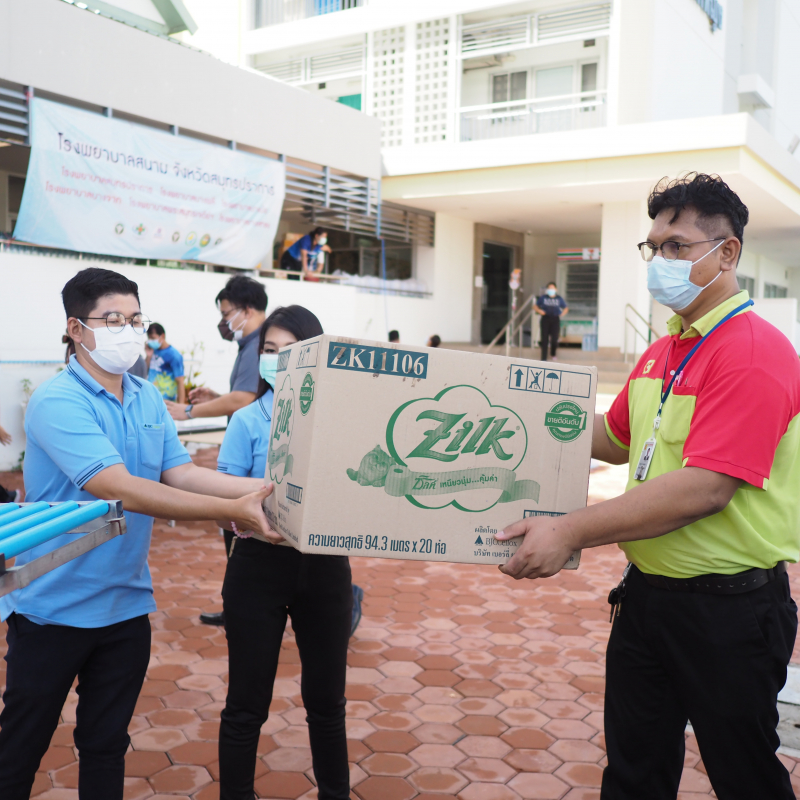

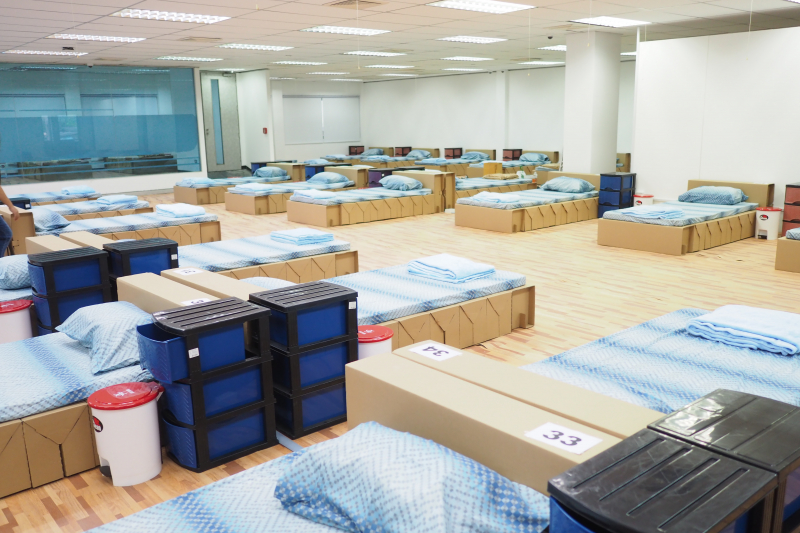
As a consequence of continued and intensified COVID-19 outbreak. The Group recognized the increasing importance of medical personnel and hospitals as front lines to help care for and assist infected population. Therefore, BJC provides assistance and support to medical personnel’s and various hospitals, including waiting centers, field hospitals and central hospitals by regularly donating necessities and various consumer products. In addition, BJC recognize the need to establish more waiting centers and field’s hospitals to reduce the concentration of infected people and increase the accessibility of treatments for infected people, therefore, BJC cooperates with external agencies to establish a waiting center and a field hospital for patient care, such as a waiting center in
the community surrounding Thanyaburi. Field Hospital, BJC, Big C and Bangpakok affiliated hospitals.
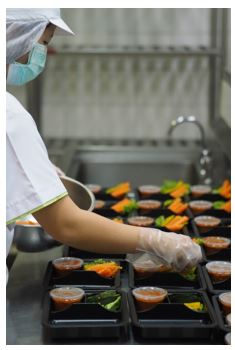

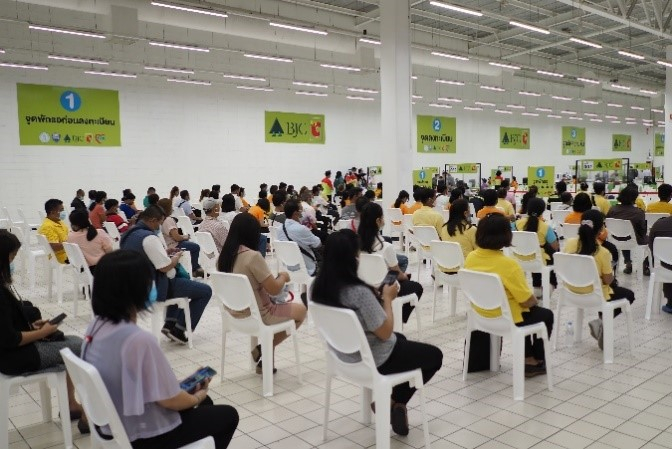
BJC acknowledge the importance of effective vaccines, which help prevent and stop the spread of COVID-19. For this reason, BJC has continuously supported research and production of vaccines for Thailand, though financial support for research at Chulalongkorn hospital. In addition, to assist government in the distribution of vaccines, BJC provides assistance by donating essentials items to various vaccination centers, including using Big C branches such as Bang Bon and Romklao branch to serve as a vaccination center for the public.
Beyond this, BJC also place importance on social responsibility to surrounding areas, near factories, warehouses or branches by preparing action plans in case of unforeseen situations, such as occurrence of an COVID-19 outbreak within the company’s premises. Appropriate steps are in place to manage and prevent the outbreak from spreading to surrounding communities, in addition to disclosing relevant information to community and society accordingly, including clarifying appropriate management guideline to foster confidence amongst communities.
10. Good Corporate Governance
As mentioned above, BJC has appointed the Board of Directors and sub-committees to oversee the actions taken in relation to COVID-19, whilst the executive committee, working groups and relevant departments are responsible to supervised closely, ensuring that operations are in accordance with the company’s sustainable development framework, good corporate governance risk management and the requirements of relevant external regulators.
BJC strictly comply with government requirements. The Risk Management Committee and The Crisis Management Steering Committee closely monitor and follow situations, to operate accordingly. This includes changing operation hours of Big C and Mini Big C to align with curfew regulations, apply for appropriate license for logistical services to operate during lockdown, and establish operation plans in case of governmental lockdown in certain provinces, to ensure the surrounding communities have access to necessary supplies.
Furthermore, BJC also works closely with provincial public health and government agencies surrounding operating areas, in order to quickly receive information’s and updates of government regulations, to put into practice properly in a timely manner, in according to government expectations. Should any unexpected events occurred, BJC will be able to immediately communicate with government agencies to promptly work to identify appropriate solutions.
BJC place great importance in regards to communication with shareholders in a transparent manner, ensuring proper disclosure of information to ease shareholder concerns regarding COVID-19’s impact upon BJC’s operations, BJC increased communication with shareholders through appropriate channels, including online, to communicate and assure shareholders of BJC’s COVID-19 management plans and approaches. During COVID-19, online technologies such as conference calls are used for shareholder meetings, while increase public information are disclosed on the company website, enabling shareholders access to updated of BJC’s strategies without interruptions.
To leverage for the decreased business as usual activities as a consequence of COVID-19, BJC strategize operational strategies to ensure consistent operational revenue, to safeguard long-term shareholder benefits.
Furthermore, to leverage for operational and logistical constraints during COVID-19, BJC re-strategized business plans, such as renegotiate financial deals and payment terms with financial entities during COVID-19. In addition to reducing all non-essential expenses through contingency plans.
BJC Recovery Strategy
From the analysis of COVID-19, BJC established 5-10 year plans to ensure business resilience from COVID-19.
Overall, BJC operations will emphasis increase focus to transition to center on efficiency, to fit with changing customer needs and behaviors. Through this shift, the number of products stocks required will drastically shift, as less customer enter physical stores, opting to shop online, thus appropriate stock management is essential to reduce waste from highly perishable products such as fresh fruits and vegetables, which ensuring that sufficient supplies are available for all customers. Furthermore, to retain competitive advantage within the new market environment, over the next 5-10 years, BJC has introduced new human capital development, occupational health and safety and service execution strategies to elevate BJC’s operation capabilities.
- Through the use of new technologies, employees are able to work from home (WFH) during COVID-19, through conference calls, minimizing exposure risk to COVID-19.
- BJC increase production of necessary products during COVID-19. E.g. BJC Glass increase production of glass bottles, which are a key medical supply. Production facilities also remain operation throughout Thailand and Vietnam to keep up with demand of glass packaging.
- BJC foster relationships with surrounding communities and societies through Big C foundation, donating medical supplies such as masks, face shields and disinfectants to various organizations and communities.
Due to the continued high outbreak rate of COVID-19, BJC Big C Group continued to support our employees and surrounding communities through various projects and activities.

